What are the most common causes of accidents at sea and how to easily prevent them? We’ll show what role human factors play and what mistakes sometimes even more experienced sailors make.
Why do accidents occur at sea?
What are the most common causes of accidents? It’s not technical failures or a sudden change in weather that sailors should fear the most. In fact, according to many estimates, human factors cause up to 78% of all accidents.
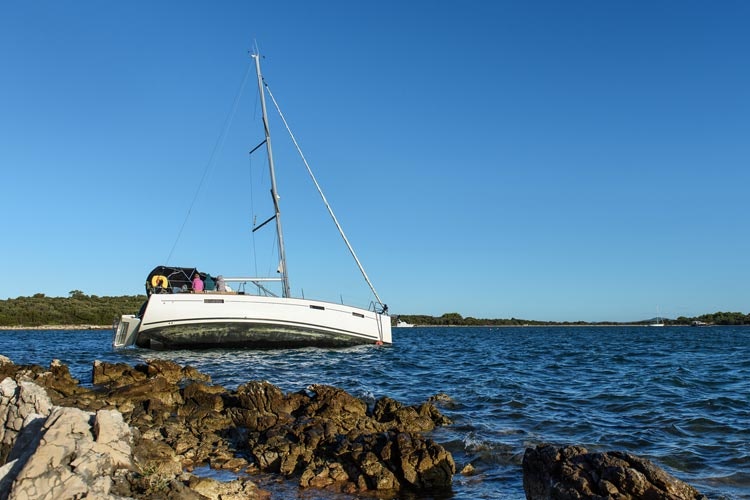 Sailboat in tilt while sailing
Sailboat in tilt while sailing These estimates suggest that technical defects cause only about 20% of accidents (counting predictable or hidden defects) with a negligible 2% being caused by unexpected external influences (tornado, earthquake, collision with a container, tree etc).
How exactly are human factors involved in accidents?
A large proportion of accidents at sea are due to human error. That's why many of them are easily avoided. We’ve compiled a list of seven of the most common causes, the consequences of which are even underestimated by more experienced sailors. Can you find your stories among them?
1. Over reliance on GPS and map plotters
Many sailors increasingly rely on modern yachting equipment. However, blind trust in navigation technology can often result in you ending up on a reef.
Small rocks and reefs are only visible when the plotter is zoomed in close, whilst on a paper map they can be seen immediately. So when the captain doesn't zoom in, he might not even see the rocks at all. This can happen to even the most seasoned sailors.
- Solution:
Navigate carefully and don’t rely on GPS and electronic maps, or even on autopilot (GPS can lose signal and give an inaccurate location, plus smaller reefs are not visible at first glance) and work with paper maps.
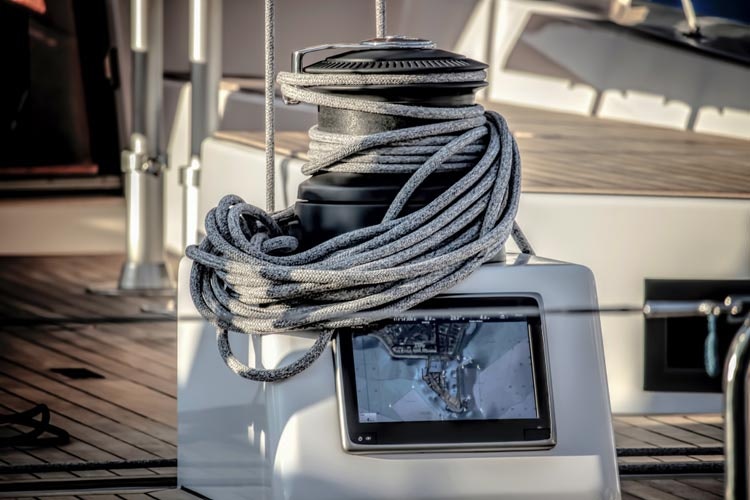 Navigate carefully and don’t rely on GPS
Navigate carefully and don’t rely on GPS 2. Alcohol
Alcohol reduces attention and clouds judgment. Fortunately, it usually leads to less serious damage and usually in the harbour - the most common form being a scratched hull when docking. However, alcohol can also lead to more fatal accidents and falling overboard (it’s important to remember that 58% of reported MOBs end in death).
- Solution:
It is ideal to keep the crew in good working order so that they can handle a crisis.
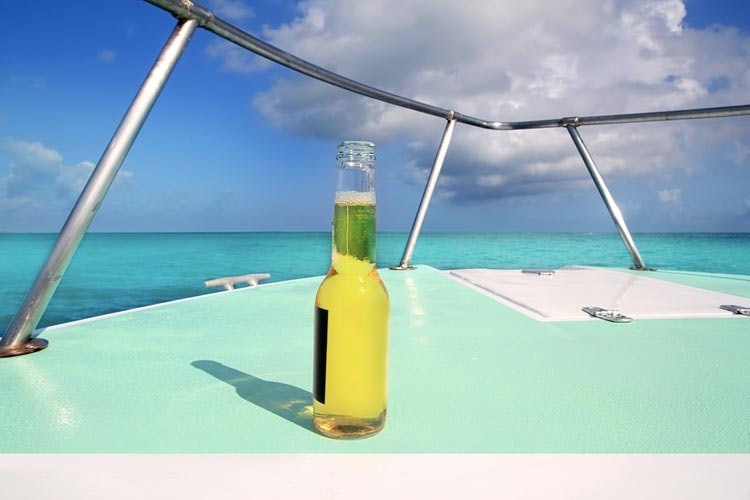 Alcohol on board can lead to fatal accidents
Alcohol on board can lead to fatal accidents 3. Feeling irreplaceable
This is mainly an issue for more experienced sailors. Under demanding meteorological conditions or longer cruises with a less experienced crew, the captain tries to remain awake all the time, preferably at the helm, and manage everything. This leads to a state of chronic fatigue and reduced decision-making ability and subsequent accidents.
The ship's captain must be the one who is in the best condition. They must give confidence to the crew and at the same time take into account their inexperience or possible sea sickness.
As long as the crew is able to function, they have to make a significant contribution to managing the boat, and the captain must be kept in the best possible condition in order to get going in a situation where no one else can.
- Solution:
Teach the crew and get coordinated, get them helming, correct them and divide up the tasks.
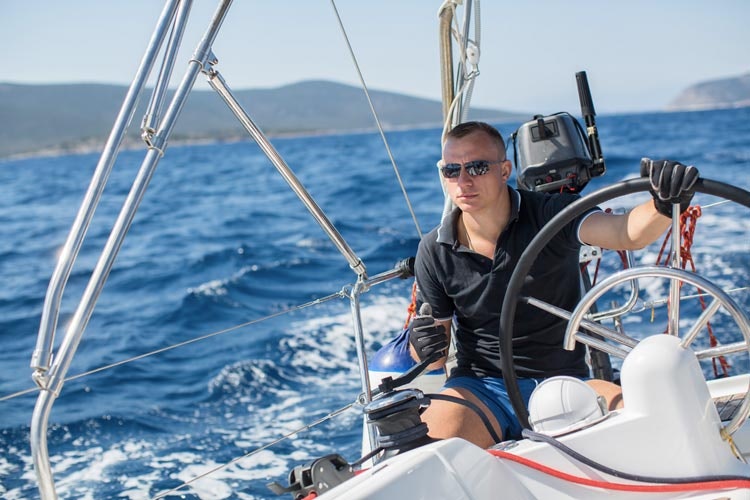 Skipper during the sailing
Skipper during the sailing 4. Underestimating danger
The captain misjudges the current situation, does not anticipate or find out information such as the specifics of the berth.
Accidents can happen easily if the captain evaluates an anchorage as safe when in reality it was done incorrectly. As a result the anchor does not actually hold, the wind shifts, and because there is no one on patrol, the boat can run aground or hit a rock.
A typical problem is also lack of information about berths, such as in city ports where the ferries frequently turn around. While turning, a ferry can produce such huge waves in the port that the ship’s stern can hit the pier, causing severe damage. This is typical, for example, of the city harbour of Vis, where accidents like this happen again and again.
When anchoring in city ports, the bottom of the rudder is sometimes damaged due to the shallow depth near the shore, as the water level drops during the night and at low tide. Particularly low levels occur during strong boras, where depth may become much lower in usually safe ports.
- Solution:
Obtain and evaluate information. Take care when controlling the boat, watch the surroundings, anticipate and prepare a backup plan.
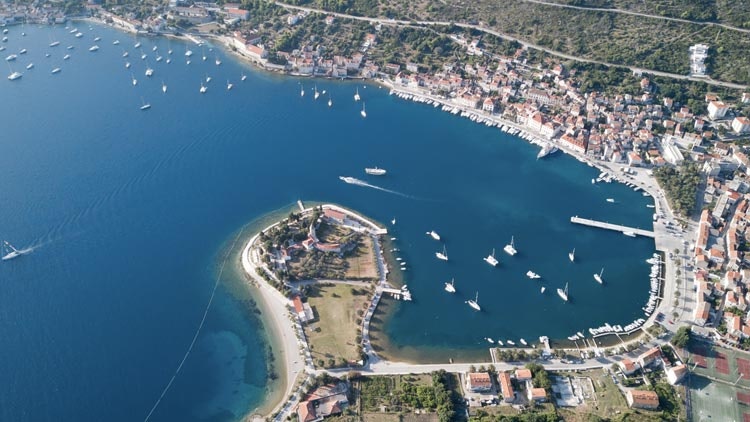 The port of Vis, in which passing ferries cause waves
The port of Vis, in which passing ferries cause waves 5. Underestimating the weather
A number of critical situations which wouldn't normally occur are due to insufficient or even a complete lack of weather analysis. Route planning doesn't stop when sailing, watch the forecast for several days in advance, anticipate and have a plan ready. If you have a route planned and the weather forecast doesn't allow for it, just change it.
- Solution:
Keep an eye on the weather forecast for more days in advance, continuously evaluate the weather and anticipate developments. Learn more about advanced meteo analysis.
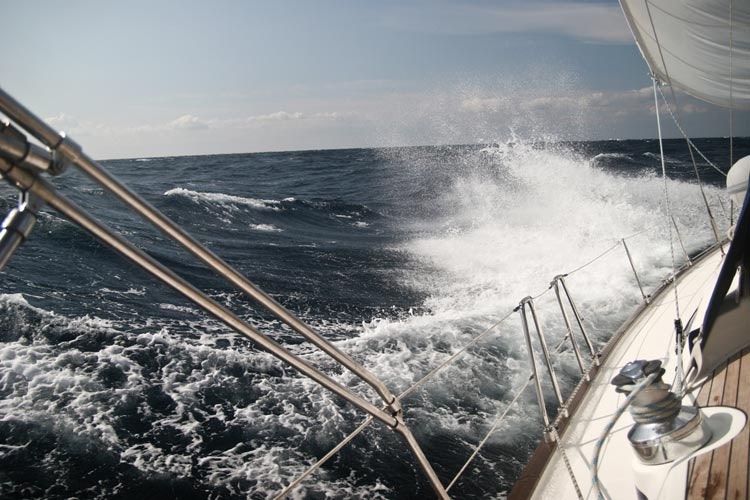 Keep an eye on the weather forecast several days in advance
Keep an eye on the weather forecast several days in advance 6. Reevaluate your own abilities
Often it’s novice sailors that tend to overestimate their own skill. With a barely-dry stamp on their license, they feel free to undertake a night crossing, sail into a stormy sea or a strong wind. At best, they will gain important experience, at worst, damage to the boat.
The less experienced yachtsman also relies too heavily on theory learned to the detriment of practice, or misinterprets the rules and overestimates their judgment. He cannot then effectively evaluate a relatively simple situation and so cannot effectively handle it or improvise.
For example, sailing relies on right of way, an inexperienced sailor might wait until the last moment until the other boat moves out the way, rather than choosing a more appropriate solution (change of course, sounding the horn) in time to prevent an accident. This is the most fundamental rule for moving (not only) at sea.
- Solution:
Train, gain practice, educate yourself, try to come up with different solutions and crisis situations. Draw on the experience of other sailors.
Tip: Read the story of how to handle a dismasting and how to spot the problem before sailing.
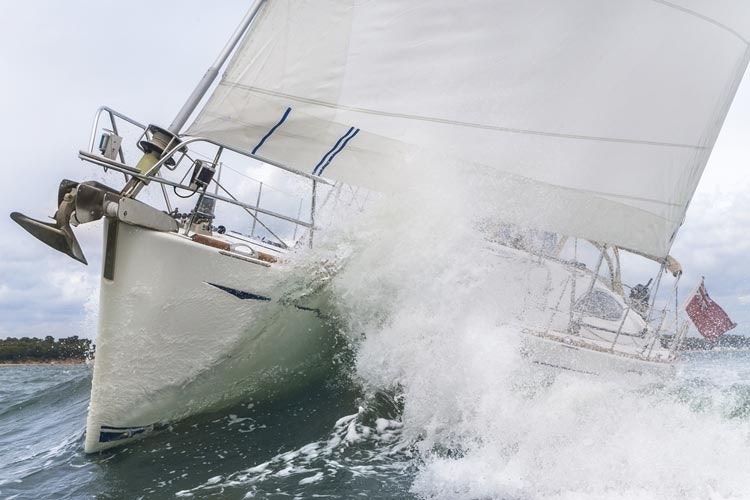 Novice sailors especially overestimate their abilities
Novice sailors especially overestimate their abilities 7. Chaos on deck
A number of accidents can be caused by mess up on deck. In an emergency, mess can make it difficult for us to sort the crisis out. Many a sailor has accidentally got their rope wound up on the propeller and this also happens fast - the rope slips quickly into the water as the boat travels. Hatches and chain shackles can also be left unsecured.
- Solution:
Keep your ship tidy, so when you have a real problem, you can focus on it 100%. Keep track of the location of your tools and rescue equipment.
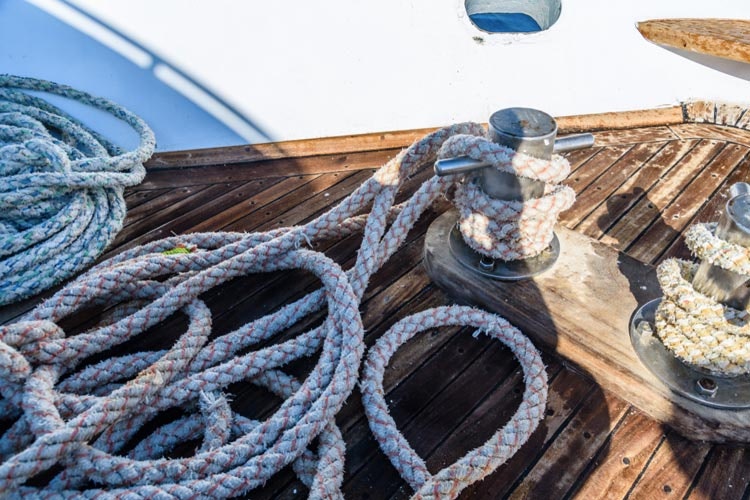 A mess on deck can lead to a number of accidents
A mess on deck can lead to a number of accidents How to prevent accidents at sea?
- Always check over the boat thoroughly, check the condition of the sails and their fixings, if in doubt insist on replacements or repairs.
- Always take care of the boat, watch the surroundings, anticipate and prepare a backup plan.
- Do everything you know you need to do on board before and during the voyage. Can you think of a problem you can avoid? Prevent it. When something unexpected happens, you will be able to sort out this new problem instead of solving an old one.
- Train, gain practice, educate yourself, try to come up with different solutions and crisis situations.
- Decision-making responsibility rests solely on the captain - therefore, if necessary, interrupt or stop the voyage.
Accidents at sea do happen and it is good to try to understand their cause. It is through this knowledge that we can effectively prevent our own accidents or resolve the next crisis at sea. Deposit insurance will also help you with peace of mind.
One of our next articles will cover the most common accidents that cause damage to boats and which specific procedures to follow when dealing with them.
Contact us
International Numbers:
UK: +44 208 08 98 515
DE: +49 211 54 69 22 23
CZ: +420 222 528 222
SK: +421 232 195 340
RU: +7 499 609 4515
Leave your details and I will contact you: